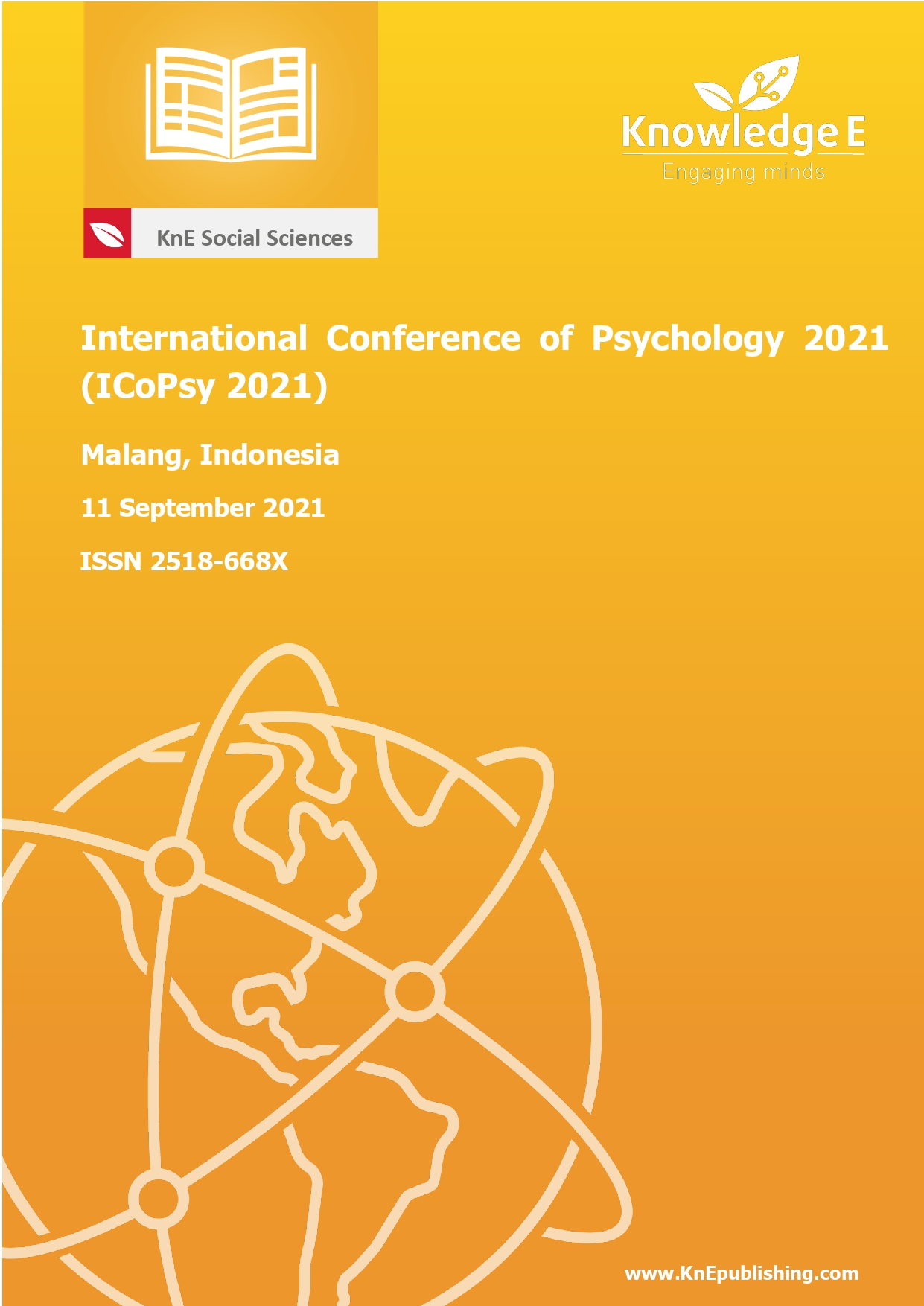Analysis of Emotional Suppression and Marital Distress in the First Five Years of Marriage
DOI:
https://doi.org/10.18502/kss.v7i1.10209Abstract
Emotional suppression is an emotion regulation strategy that is often used in Eastern or Asian cultures like in Indonesia. Emotional suppression can be related to various outcomes in marital relationships such as marital distress. This research explored the association between emotional suppression and marital distress in individuals during their first five years of marriage. 1770 married participants from various regions in Indonesia participated (mean marriage length = 23.49 months). The research variables were measured using the Emotional Regulation Questionnaire (ERQ) and the Revised Dyadic Adjustment Scale (RDAS). Emotional suppression and marital distress were found to be negatively correlated. Differences in the norms in various situations across the culture seemed to influence the result. Inferential statistics were calculated to determine whether there was a significant difference in individual marital distress levels based on gender, the number of children, residential status, and changes in sexual activity during the Covid-19 pandemic.
Keywords: marital distress, emotional suppression, early marriage, Covid-19 pandemic
References
[2] Bradbury TN, Weiss RL. The developmental course of marital dysfunction. Cambridge: Cambridge University Press; 2006.
[3] Anim MT. Psychosocial factors influencing marital distress in Ghanaian married couples. Research on Humanities and Social Sciences. 2013;3(1):161–171.
[4] Markman HJ, Rhoades GK, Stanley SM, Ragan EP, Whitton SW. The premarital communication roots of marital distress and divorce: The first five years of marriage. Journal of Family Psychology. 2010;24(3), 289–298. https://doi.org/10.1037/a0019481
[5] Gross JJ, John OP. Individual differences in two emotion regulation processes: Implications for affect, relationships, and well-being. Journal of Personality and Social Psychology. 2003;85(2):348–362. https://doi.org/10.1037/0022-3514.85.2.348
[6] Impett EA, Kogan A, English T, et al. Suppression sours sacrifice: Emotional and relational costs of suppressing emotions in romantic relationships. Personality and Social Psychology Bulletin. 2012;38(6):707–720. https://doi.org/10.1177/0146167212437249
[7] Gross JJ, Levenson RW. Hiding feelings: The acute effects of inhibiting negative and positive emotion. Journal of Abnormal Psychology. 1997;106(1):95–103. https://doi.org/10.1037/0021-843X.106.1.95
[8] Butler EA, Lee TL, Gross JJ. Does expressing your emotions raise or lower your blood pressure? The answer depends on cultural context. Journal of Cross-Cultural Psychology. 2009;40(3):510–517. https://doi.org/10.1177/0022022109332845
[9] Butler EA, Egloff B, Wlhelm FH, Smith NC, Erickson EA, Gross JJ. The social consequences of expressive suppression. Emotion. 2003;3(1):48–67. https://doi.org/10.1037/1528-3542.3.1.48
[10] Righetti F, Balliet D, Visserman M, Hofmann W. Trust and the suppression of emotions during sacrifice in close relationships. Social Cognition. 2015;33(5):505– 519. https://doi.org/10.1521/soco.2015.33.5.505
[11] Velotti P, Balzarotti S, Tagliabue S, English T, Zavattini GC, Gross JJ. Emotional suppression in early marriage: Actor, partner, and similarity effects on marital quality. Journal of Social and Personal Relationships. 2016;33(3):277–302. https://doi.org/10.1177/0265407515574466
[12] Chervonsky E, Hunt C. Suppression and expression of emotion in social and interpersonal outcomes: A meta-analysis. Emotion. 2017;7(4):669–683. https://doi.org/10.1037/emo0000270
[13] Le BM, Impett EA. When holding back helps: Suppressing negative emotions during sacrifice feels authentic and is beneficial for highly interdependent people. Psychological Science, 2013;24(9):1809–1815. https://doi.org/10.1177/0956797613475365
[14] Pietromonaco PR, Overall NC. Applying relationship science to evaluate how the COVID-19 pandemic may impact couples’ relationships. American Psychologist. 76(3), 438-450. 2020. https://doi.org/10.1037/amp0000714
[15] Restubog SLD, Ocampo ACG, Wang L. Taking control amidst the chaos: Emotion regulation during the COVID-19 pandemic. Journal of Vocational Behavior. 2020;119:103440. https://doi.org/10.1016/j.jvb.2020.103440
[16] Maiti T, Singh S, Innamuri R, Hasija AD. Marital distress during COVID-19 pandemic and lockdown: A brief narrative. The International Journal of Indian Psychology. 2020;8(2):426–433.
[17] Williamson HC. Early effects of the COVID-19 pandemic on relationship satisfaction and attributions. Psychological Science. 2020. 095679762097268. https://doi.org/10.1177/0956797620972688
[18] Gravningen K, Mitchell KR, Wellings K, et al. Reported reasons for breakdown of marriage and cohabitation in Britain: Findings from the third National Survey of Sexual Attitudes and Lifestyles (Natsal-3). PLOS ONE. 2017;12(3):e0174129. https://doi.org/10.1371/journal.pone.0174129
[19] Panzeri M, Ferrucci R, Cozza A, Fontanesi L. Changes in sexuality and quality of couple relationship during the Covid-19 lockdown. Frontiers in Psychology. 2020;11:565823. https://doi.org/10.3389/fpsyg.2020.565823
[20] Gravetter FJ, Forzano L-AB. Research Methods for the Behavioral Sciences. Massachusets: Cengage Learning. 2018.
[21] Ekman P. Should we call it expression or communication? Innovation: The European Journal of Social Science Research. 1997;10(4):333–344. https://doi.org/10.1080/13511610.1997.9968538
[22] Kowal M, Coll-Martín T, Ikizer G, et al. Who is the most stressed during the Covid- 19 pandemic? Data from 26 countries and areas. Applied Psychology: Health and Well-Being. 2020;12(4):946–966. https://doi.org/10.1111/aphw.12234
[23] Lehmiller JJ, Garcia JR, Gesselman AN, Mark KP. Less sex, but more sexual diversity: Changes in sexual behavior during the COVID-19 coronavirus pandemic. Leisure Sciences. 2020;1–10. https://doi.org/10.1080/01490400.2020.1774016
[24] Arafat SMY, Alradie-Mohamed A, Kar SK, Sharma P, Kabir R. Does COVID-19 pandemic affect sexual behaviour? A cross-sectional, cross-national online survey. Psychiatry Research. 2020;289. https://doi.org/10.1016/j.psychres.2020.113050
[25] Lavner JA, Karney BR, Bradbury TN. Does couples’ communication predict marital satisfaction, or does marital satisfaction predict communication? Journal of Marriage and Family. 2016;78(3):680–694. https://doi.org/10.1111/jomf.12301
[26] Harsari RJT. A perspective of husband and wife roles in long-distance marriage. 5th ASEAN Conference on Psychology, Counselling, and Humanities (ACPCH 2019). 2020 January 22; Penang, Malaysia. https://doi.org/10.2991/assehr.k.200120.056

